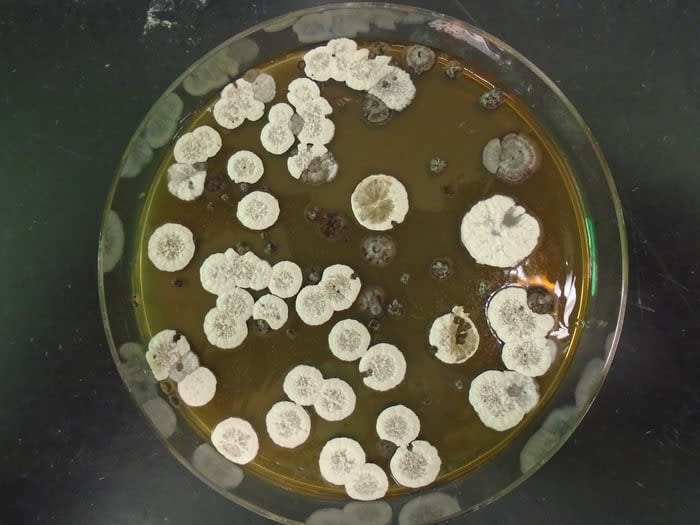Tiny Bacteria Create Jet Fuel Ingredients as They Eat Lunch

Jet fuel is the backbone for a vast majority of our defense systems and supply chain infrastructure. Without it, Tom Cruise can’t fly his F-18 in Top Gun and you can’t get your Amazon Prime purchases with one-day shipping. But there’s a problem: We’re running out of it. Luckily, a team of researchers might have found an innovative solution in tiny bacteria.
In a new study published today in the journal Joule, scientists say they might have discovered a bacteria that actually produces a carbon molecule as it eats that can release a large amount of energy. The team believes that they can now synthesize the molecule to create a substance that can potentially be used to create jet fuel.
The novel approach is the brainchild of Jay Keasling, a chemical engineer and researcher at the University of California, Berkeley. He wanted to explore a molecule created as a byproduct of streptomyces, a common bacteria. “Keasling told me: It’s gonna be an explosive idea,” Pablo Cruz-Morales, a microbiologist at the Technical University of Denmark and lead author of the study, said in a press release.
“The recipe already exists in nature,” Cruz-Morales added. “As they eat sugar or amino acids, they break them down and convert them into building blocks for carbon-to-carbon bonds. You make fat in your body in the same way, with the same chemistry, but this bacterial process has some very interesting twists.”

The common bacteria streptomyces which makes molecules that have explosive properties.
The unique shapes of the molecules allow it to rapidly produce high amounts of energy when ignited. The team believes that it even has the potential to be able to launch a rocket into space.
“If we can make this fuel with biology there's no excuses to make it with oil,” Cruz-Morales explained. “It opens the possibility of making it sustainable.”
However, Cruz-Morales said that a major hurdle stands in their way: fossil fuel subsidies. In order for a sustainable fuel to be developed, they need to work against the politics and sentiment surrounding existing energy infrastructure. But the team now hopes to partner with the U.S. Department of Energy in order to produce the fuel on a larger scale. Once that happens, it’ll open the doors for the substance to be used by aircraft and potentially rockets.
“You can see this as a preparation for the moment because we are going to run out of fossil fuels, and there's going to be a point, not far from now, when we will need alternative solutions,” Cruz-Morales said.
Got a tip? Send it to The Daily Beast here
Get the Daily Beast's biggest scoops and scandals delivered right to your inbox. Sign up now.
Stay informed and gain unlimited access to the Daily Beast's unmatched reporting. Subscribe now.

 Yahoo Movies
Yahoo Movies 
